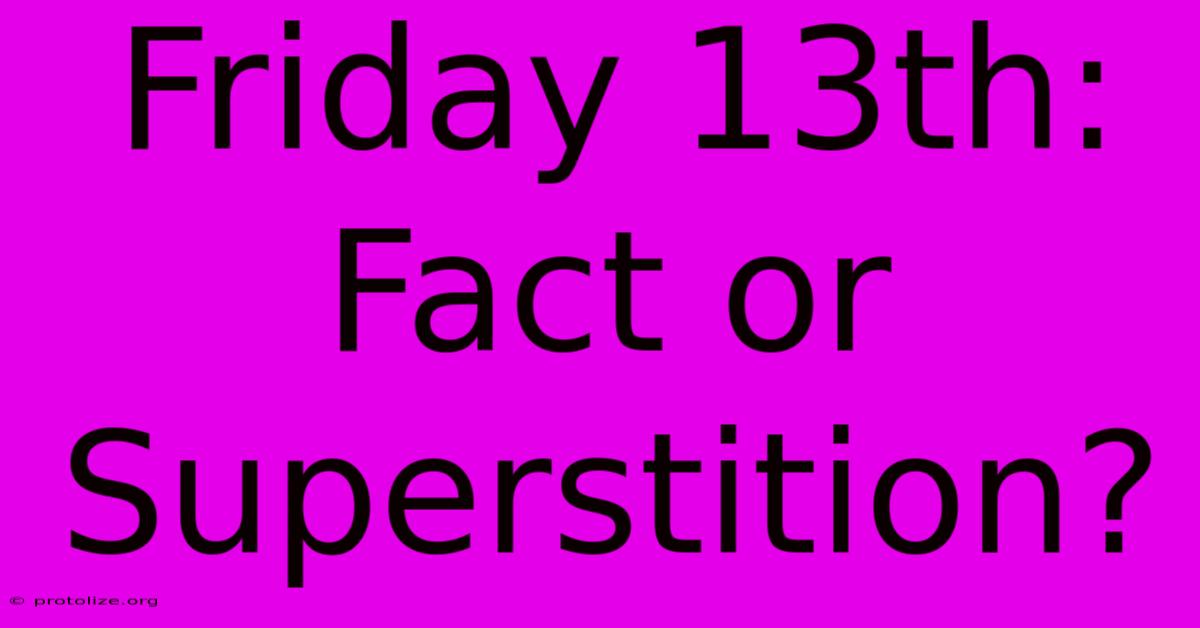Friday 13th: Fact Or Superstition?

Discover more detailed and exciting information on our website. Click the link below to start your adventure: Visit Best Website mr.cleine.com. Don't miss out!
Table of Contents
Friday the 13th: Fact or Superstition?
Friday the 13th. Just the phrase conjures images of black cats, broken mirrors, and a general sense of impending doom. But is this widely held belief rooted in fact, or is it simply a superstition passed down through generations? Let's delve into the history and psychology behind this intriguing phenomenon.
The Roots of the Fear: A Deep Dive into History
While the modern association of Friday the 13th with bad luck is relatively recent, the individual components – Friday and the number 13 – have long been associated with negativity in various cultures.
Friday: A Day of Ill Omen?
In Christianity, Friday is forever linked to the crucifixion of Jesus Christ. This association cemented Friday's reputation as an unlucky day in many Western cultures. Adding to this, some historical events, though coincidental, solidified Friday's negative connotation.
The Number 13: A Historically Unlucky Number?
The number 13 has been considered unlucky in many cultures for centuries. In Norse mythology, 12 gods were present at a feast when a 13th, Loki, arrived and caused the death of Baldr, a beloved god. Similarly, the Last Supper involved 13 attendees, culminating in the betrayal and crucifixion of Jesus. These narratives have contributed to the widespread perception of 13 as an ominous number.
The Psychology Behind Triskaidekaphobia
The fear of Friday the 13th is officially known as paraskevidekatriaphobia. This phobia is a combination of paraskevi (Friday in Greek), dekatria (thirteen in Greek), and phobia (fear). It's a prime example of how cultural beliefs can manifest as psychological anxieties.
Confirmation Bias and the Self-Fulfilling Prophecy
People who believe in the ill fortune associated with Friday the 13th may subconsciously exhibit more cautious behavior on that day. This heightened awareness can, ironically, lead to more accidents or misfortunes, thereby reinforcing their belief. This is a perfect example of confirmation bias and the self-fulfilling prophecy. We tend to notice and remember events that confirm our existing beliefs, while ignoring those that contradict them.
Is There Any Statistical Evidence?
Interestingly, some studies have shown a slight increase in accidents and hospital admissions on Friday the 13th. However, these increases are generally small and could be attributed to various factors unrelated to superstition, such as increased traffic volume or the psychological effects of the day itself. Essentially, the statistical evidence is inconclusive and doesn't definitively prove a causal link.
Friday the 13th in Popular Culture
The enduring fascination with Friday the 13th has led to its prominent role in popular culture, notably in the successful Friday the 13th horror film franchise. This cinematic portrayal has further solidified the day's association with fear and suspense.
Embracing Rationality: Conquering the Superstition
While the fear of Friday the 13th is deeply ingrained in many, understanding its historical and psychological roots can help alleviate anxiety. Recognizing the influence of confirmation bias and self-fulfilling prophecies allows us to approach the day with a more rational and less fearful perspective. Ultimately, whether you believe in the superstition or not, it's a fascinating example of the power of cultural beliefs and their impact on our perceptions of the world.
Conclusion: A Day Like Any Other?
So, is Friday the 13th truly unlucky? The answer is likely no. While the historical and cultural connotations are undeniable, the lack of concrete evidence suggests it's primarily a superstition. However, the enduring power of this belief highlights the fascinating interplay between culture, psychology, and our collective imagination. So, on the next Friday the 13th, choose to approach the day with a sense of awareness rather than fear, and remember the power of rational thought in overcoming superstition.

Thank you for visiting our website wich cover about Friday 13th: Fact Or Superstition?. We hope the information provided has been useful to you. Feel free to contact us if you have any questions or need further assistance. See you next time and dont miss to bookmark.
Featured Posts
-
Viral Video Nz Polices Official Response
Dec 13, 2024
-
Arrest James Kennedy Vanderpump Star
Dec 13, 2024
-
Worcester Greenstar 25i Erp Manual
Dec 13, 2024
-
Greenstar 30i Erp Manual
Dec 13, 2024
-
Biden Could Commute More Sentences
Dec 13, 2024
